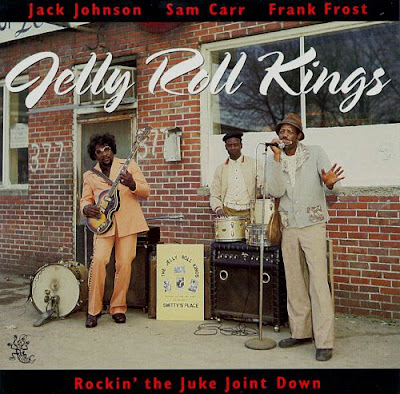Frank Otis Frost (April 15, 1936 – October 12, 1999) was one of the foremost American Delta blues harmonica players of his generation.
Most sources state that Frost was born in 1936 in Auvergne, Jackson County, Arkansas, though researchers Bob Eagle and Eric LeBlanc state Patterson, Woodruff County, in 1938. Frost began his musical career at a young age by playing the piano for his family church. At the age of 15, Frost left for St. Louis, where he became a guitarist.
 He moved to St. Louis in 1951, learning how to blow harp first from Little Willie Foster and then from the legendary Sonny Boy Williamson, who took him on the road -- as a guitar player -- from 1956 to 1959. Drummer Sam Carr, a longtime Frost ally, was also part of the equation, having enticed Frost to front his combo in 1954 before hooking up with Sonny Boy.
He moved to St. Louis in 1951, learning how to blow harp first from Little Willie Foster and then from the legendary Sonny Boy Williamson, who took him on the road -- as a guitar player -- from 1956 to 1959. Drummer Sam Carr, a longtime Frost ally, was also part of the equation, having enticed Frost to front his combo in 1954 before hooking up with Sonny Boy.Leaving Williamson's employ in 1959, Frost and Carr settled in Lula, Mississippi. Guitarist Jack Johnson came on board in 1962 after sitting in with the pair at the Savoy Theatre in Clarksdale. The three meshed perfectly -- enough to interest Memphis producer Sam Phillips in a short-lived back-to-the-blues campaign that same year. Hey Boss Man!, issued on Sun's Phillips International subsidiary as by Frank Frost & the Night Hawks, was a wonderful collection of uncompromising Southern blues (albeit totally out of step with the marketplace at the time).
Elvis Presley's ex-guitarist Scotty Moore produced Frost's next sessions in Nashville in 1966 for Jewel Records. Augmented by session bassist Chip Young, the trio's tight down-home ensemble work was once again seamless. "My Back Scratcher," Frost's takeoff on Slim Harpo's "Baby Scratch My Back," even dented the R&B charts on Shreveport-based Jewel for three weeks.
Chicago blues fan Michael Frank sought out Frost in 1975. He located Frost, Johnson, and Carr playing inside Johnson's Clarksdale tavern, the Black Fox. Frank was mesmerized by their soundand soon formed his own record label, Earwig, to capture their raw, charismatic brand of blues.
Released in 1979, Rockin' the Juke Joint Down, billed as by the Jelly Roll Kings (after one of the standout songs on that old Phillips International LP), showcased the trio's multifaceted approach -- echoes of R&B, soul, and even Johnny & the Hurricanes permeate their Delta-based attack.
Released in 1979, Rockin' the Juke Joint Down, billed as by the Jelly Roll Kings (after one of the standout songs on that old Phillips International LP), showcased the trio's multifaceted approach -- echoes of R&B, soul, and even Johnny & the Hurricanes permeate their Delta-based attack.
Cigarettes and alcohol wore Frost down over the years but he waxed an Earwig album (1988's Midnight Prowler) and appeared on Atlantic's 1992 Deep Blues soundtrack -- an acclaimed film that reinforced the fact that blues still thrives deep in its Southern birthplace. Frost returned in 1996 with Keep Yourself Together.
In later years, Frost's health declined, yet he continued to play. Four days before his death, he appeared with Carr at the King Biscuit Blues, where he was brought onstage in a wheelchair during a set by Carr and given a harmonica, which he had trouble playing. Carr, said one of his band mates, had tears in his eyes as he performed.
He died of cardiac arrest at his home in Helena, Arkansas in 1999, and is buried in Magnolia Cemetery in Helena. he was 63.
(Edited from a Bill Dahhl bio @ AllMusic & Wikipedia)





